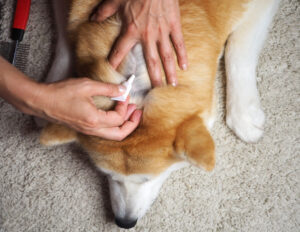Have you noticed your cat drooling more than usual? It might have caught your attention and left you wondering, “Why is my cat drooling so much?” This blog aims to shed light on the possible reasons behind your cat’s drooling and what actions you can take. We understand your concerns for your pet’s health and are here to offer insights into why this might be happening. If you find yourself needing more information or wish to discuss your cat’s health, please reach out to Harlingen Veterinary Clinic at (908) 359-2000 to schedule an appointment. Our team is ready to assist you with all your pet care needs in Belle Mead, NJ.
Understanding Cat Drooling
Drooling, or the act of saliva flowing outside the mouth, is not as common in cats as it is in some other animals. When it happens, it could be a sign of various things. Some reasons are harmless, like being relaxed or content, especially if you notice this behavior while petting your beloved cat. However, excessive drooling can also indicate health issues that need attention.
Signs of Happiness
Surprisingly, a happy cat might drool when feeling extremely content and relaxed. This kind of drooling is usually accompanied by purring and kneading behaviors. If your cat only drools during these blissful moments, there’s likely no cause for concern.
Dental Problems
One of the more common reasons for a cat to start drooling excessively is dental disease. Issues like gingivitis, periodontal disease, or tooth abscesses can cause pain and lead to increased saliva production. If you notice bad breath along with the drooling, it’s time to consult with us.
Nausea or Upset Stomach
Cats might drool more when they’re feeling nauseous or have an upset stomach. This could be due to various reasons, including eating something they shouldn’t have. Watch for other signs of gastrointestinal distress, such as vomiting or decreased appetite.
Foreign Objects
Sometimes, cats explore with their mouths and can accidentally ingest or get something stuck, like a piece of string or a small toy. This can cause discomfort and result in drooling. It’s important to check your cat’s mouth gently if you suspect this might be the case.
Stress and Anxiety
Just like humans, cats can experience stress and anxiety, which may lead to excessive drooling. Changes in the environment, such as moving to a new home or the introduction of a new pet, can trigger this response.
Health Concerns
Certain health issues, including oral tumors, respiratory infections, and even poisoning, can cause your cat to drool excessively. It’s crucial to observe any additional symptoms like lethargy, difficulty breathing, or changes in eating habits and seek veterinary care promptly.
When to Contact Harlingen Veterinary Clinic
If you notice any sudden changes in your cat’s drooling habits, especially if it’s accompanied by other signs of illness, it’s important to act quickly. Our team at Harlingen Veterinary Clinic is here to help. Early detection and treatment can make a significant difference in your cat’s health and comfort.
Dental Check-ups
Regular dental check-ups are important for catching and treating dental issues early. We can help prevent dental problems from becoming more serious and causing excessive drooling.
Regular Health Screenings
Keeping up with your cat’s health screenings can help identify and address any underlying health issues that might be causing the drooling. Our team can guide you on the appropriate screenings for your cat’s age and health status.
Emergency Situations
In cases of sudden and excessive drooling, especially if it’s accompanied by other concerning symptoms, please call us immediately. This could indicate a serious health issue that requires prompt attention.
Taking the Next Steps
If you’re wondering, “Why is my cat drooling so much?” and are concerned about their health, we’re here to support you. At Harlingen Veterinary Clinic, we understand the bond between pets and their owners, and we strive to provide the care your cat needs. For more information or to make an appointment, please contact us at (908) 359-2000. Our team is committed to helping you ensure your cat’s health and happiness.





